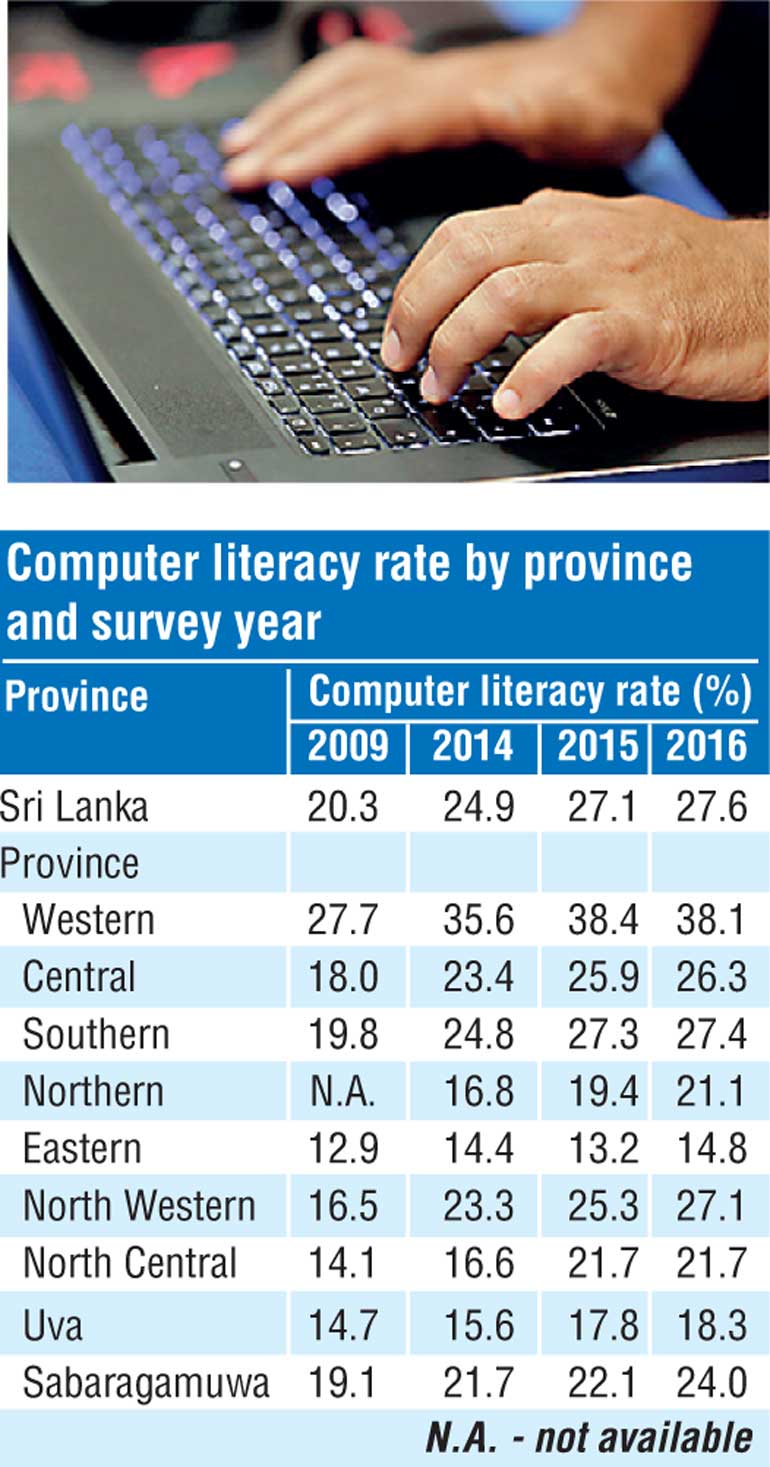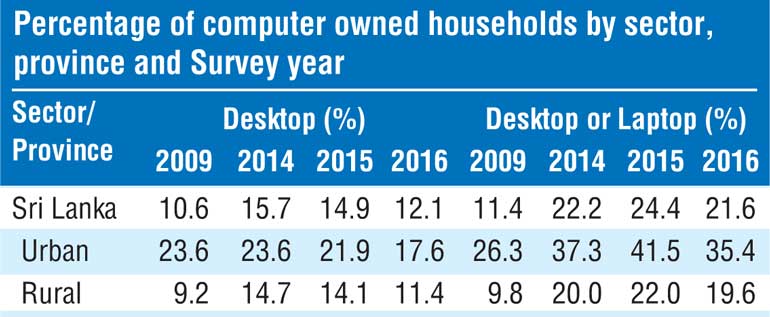Saturday Feb 14, 2026
Saturday Feb 14, 2026
Wednesday, 30 August 2017 00:30 - - {{hitsCtrl.values.hits}}


Sri Lanka may be enthusiastic about creating a digital economy but ownership of computers and laptops has declined whilst there is no major improvement in the computer literacy rate of the country, according to the latest available survey.
The percentage of desktop- and laptop-owning households has declined to 21.6% last year from 24.4% in 2015 and 22.2% in 2014 as per the latest survey by the Department of Census and Statistics. The 2016 data suggests that about one out of every five households owns either a desktop computer or a laptop. The decline has been reported in both urban and rural households.
The percentage of desktop-owning households was a low of 12.1% last year, down from 14.9% in 2015 and a high of 15.7% in 2014. The biggest decline has been reported in urban households. The department attributed the decline to changes that had occurred in usage patterns, such as the result of the arising usage smartphones and tablet computers.
The highest availability is in the Western Province (33.6%) while the lowest availability is reported from the Eastern Province (11.2%).
Whilst being alarmed by the latest findings, IT industry sources viewed the Government’s move to distribute tabs to schoolchildren as a welcome measure.
In a related development, computer literacy on the other hand has improved, although marginally.
In 2016, the computer literacy rate was 27.6%, as against 27.1% in the previous year. In 2014 it was 24.9% and in 2009 the figure was 20.3%.
When digital literacy is considered, one out of every three (aged 5-69) has digital literacy i.e. 33.8% in 2016 up from 27.6% in the previous year. Digital literacy is higher than computer literacy for all disaggregated levels, showing the drift from personal computer to smartphones/tablets.
Urban areas were more computer literate at 39.2%, though this figure has remained unchanged for two years. In 2014 urban area computer literacy was 36.1%. In rural areas the computer literacy rate improved to 26.1% from 25.5% in 2015. Males were more literate at 29.5% as against females (26%).
Those aged between 15 and 19 were the most computer literate at 62.5% followed by 20-24 at 54.3% and 25-29 at 43.8%. By language, English computer literacy is the highest at 72.5% with Sinhala at 33.4% and Tamil at 27.2%.
A person (aged 5-69) is considered a computer literate person if he or she can use a computer on his or her own. For example, even if a five-year-old child can play a computer game then he or she is considered a computer literate person.
Computer literacy among the employed population who are aware of computers in Sri Lanka is around 64.8 % in 2016, up from 42% in 2015.
Among the unemployed, the 20-24 age group shows the highest computer literate population percentage (70.0%). Annual results reveal that among the unemployed many have at least some ICT skills. Even among the group aged 40-69 every one out of four was computer literate (24.2%) in 2016.
Around 16.1% of the population used the internet at least once in 12 months in 2016. The survey results further reveal that the urban sector, where facilities are largely available, shows the highest usage of both e-mail and internet compared to the other two sectors.
The survey results reveal that 9.0% of the household population aged 5-69 years has used e-mail at least once during the last 12 months. Persons in the age group 20-24 indicate a higher internet and email usage (40% internet and 23.6% email) compared to persons in other age groups.
The Census and Statistics Department said the birth of the Information Age, which is also known as the Computer Age, is associated with the Digital Revolution, just as the Industrial Revolution marked the birth of the Industrial Age.
The Digital and Information and Communication Technology (ICT) revolutions are twin revolutions. The rapid developments in ICT have greatly contributed in enhancing human living standards worldwide. The advanced capability of this technology facilitates extremely efficient collaboration and access to correct, consistent and effective information, which is fundamental to manage the quality in total.
In the developed world, most of the key economically effective environments are increasingly ICT dominant. Timely and accurate information on the use of ICT itself is essential for the justification and proper direction of Government efforts, private sector investment, to study the changing pattern of the demand for internet services and for continuous progress monitoring ICT achievements. For this computer literacy data can contribute immensely to an understanding of the demand and supply of skills in the global, knowledge-based economy. Statistics on the availability of a computer/laptop in households and usage of internet and email can be used to assess the digital divide.